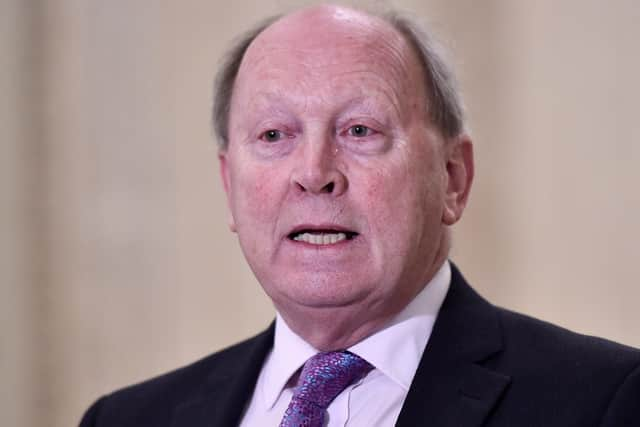TUV: There is no fight left in DUP over an Irish language Act
and live on Freeview channel 276
Internal DUP anger over the matter and the government’s agreement to legislate for Irish via Westminster was a key factor in the ousting of outgoing leader Edwin Poots.
Asked on Saturday what his stance is on the matter, Sir Jeffrey Donaldson said: “I am very clear that if the Government proceeds to concede to Sinn Fein demands and goes over the head of the Assembly on these issues and, at the same time, fails to address unionist concerns on the Protocol, that is not a sustainable position – to use the words of the Government – that is not a tenable position.”
Advertisement
Hide AdAdvertisement
Hide AdHe added: “And therefore, we need to see the Government moving on the Protocol. And then we will look at the NDNA (New Decade New Approach agreement) issues at Stormont and how we take those forward.”


But TUV leader Jim Allister was critical of the stance.
“The DUP’s position on the Irish Language legislation is becoming increasingly equivocal, with no evident fight now attending their stance,” he said. “Of course, the truth is that they sold out on this issue for the sake of power under the ‘New Decade New Approach [deal]’. “So, if and when the aggressive advance of Irish language is rolled out under a turbo-charged Commissioner, let it be remembered who paid the ransom.”
Jim Wells MLA said he believed that 90% of the legislation would come through Stormont and the rest through Westminster.
“An Irish Language Act in the present circumstances will be exceptionally difficult to sell to unionist voters,” he said, though acknowledged that his party committed to it in the NDNA deal.
Advertisement
Hide AdAdvertisement
Hide AdHowever since that there has been the NI Protocol, the Bobby Storey Funeral and the veto of a commemoration stone and rose at Stormont to mark NI’s centenary, he said.
He believed that DUP members rebelled against Edwin Poots over the matter because they were not being given enough time to take the government plans back to their constituencies to consult on them.
It is a “sensitive” matter going right back to the St Andrew’s Agreement in 2006, he said.
When speaking on Saturday, Sir Jeffrey made little reference to the Irish language, he said.
Advertisement
Hide AdAdvertisement
Hide Ad“No doubt he will outline his policies when he formally becomes the leader,” he added.
Mr Wells said he was also very sceptical as to whether there would be enough time to push Irish legislation through the assembly in this mandate, but said it could be reintroduced in May next year.
David Campbell, chairman of the Loyalist Communities Council (LCC) said Mr Donaldson was right to describe legislating for Irish via Westminster as “untenable”.
The LCC’s initial concerns are that the government plans now “clearly breach the Belfast Agreement’s determinations on language and culture” adding that no unionist MLA has a mandate to so “dramatically” alter an Agreement that was passed by referendum.
Advertisement
Hide AdAdvertisement
Hide AdHe said the Belfast Agreement supports “appropriate demand and desire” for the Irish language but that the NDNA goes much further, making it a “requirement”. He added: ““The list of public bodies that will have to develop Irish language plans and protocols are so extensive - even down to Boards of Governors of schools potentially - meaning that the language will be thrust upon those who do not want it.”
Alliance MP Stephen Farry MP said his party wants to see timely implementation of all relevant aspects of NDNA, including the language and culture package, via the Assembly - not Westminster.
“It is only with great reluctance that we would support action via Westminster,” he said. “If the DUP want to avoid Westminster acting, it is within their power to ensure that the package that they themselves agreed is commenced in the Assembly.”
The Northern Ireland Office has emphasised that the NDNA contains a “balanced package of identity, language & culture measures for both Irish language and Ulster Scots, and will benefit all communities in Northern Ireland”.
Advertisement
Hide AdAdvertisement
Hide AdIt says the legislation will provide for the creation of an Office of Identity and Cultural Expression, an Ulster Scots Commissioner, and an Irish Language Commissioner, as per the NDNA agreement
The Secretary of State announced on 21 June that, if the Executive has not progressed the legislation for the identity, language and culture package by the end of September, the UK Government will introduce it in the UK Parliament in October if necessary.
MORE NEWS:
Advertisement
Hide AdAdvertisement
Hide AdA message from the Editor:
Thank you for reading this story on our website. While I have your attention, I also have an important request to make of you.
With the coronavirus lockdown having a major impact on many of our advertisers - and consequently the revenue we receive - we are more reliant than ever on you taking out a digital subscription.
Subscribe to newsletter.co.uk and enjoy unlimited access to the best Northern Ireland and UK news and information online and on our app. With a digital subscription, you can read more than 5 articles, see fewer ads, enjoy faster load times, and get access to exclusive newsletters and content. Visit https://www.newsletter.co.uk/subscriptions now to sign up.
Advertisement
Hide AdAdvertisement
Hide AdOur journalism costs money and we rely on advertising, print and digital revenues to help to support them. By supporting us, we are able to support you in providing trusted, fact-checked content for this website.
Alistair Bushe
Editor